- Home
- Jean R. Ewing
Love's Reward Page 2
Love's Reward Read online
Page 2
Fitzroy grinned at her. “I should think it counts a great deal more that he’s also a son of the Earl of Evenham. After all, am I so very respectable?”
Sipping at her wine, she grinned back. “Barely, I suppose. But being our father’s heir is bound to give you an entrée everywhere, and Quentin benefits from that. He certainly uses it. Otherwise, there’s no comparison between you.”
“For I have the courtesy of being Viscount Tarrant, while Quentin must make do with being just plain Mister Mountfitchet. I wonder sometimes why he hasn’t shot me over it. So he met this schoolgirl and arranged an elopement? Who is the intended bride?”
Lady Mary set down her wine and looked up at him.
“That’s the worst of it, Fitzroy. It’s not just any schoolgirl. It’s Lady Joanna Acton, and she’s not even out.”
“Dear God!”
Fitzroy collapsed into a chair. Then he dropped his head to his knees to bury his face in his hands.
“It is very bad, isn’t it? If she’s ruined, Lord Acton will demand a match—”
He looked up, fighting back a desperate, wild laughter. At the look of open despair on her face, he let it loose.
“A wedding? Then Quentin’s cat will be out of the bag!”
Lady Mary’s eyes filled with indignation. “How can you laugh? She’s the Earl of Acton’s favorite daughter, Fitzroy.”
He sprawled back in his chair. “But that’s not really the worst of it, unfortunately.”
“What can be worse? Oh, Fitzroy, will you please go after them?”
“Of course.” He stood up and rang the bell. A footman appeared at the door. “Lord Evenham’s carriage for Lady Mary, and have my phaeton brought around. We are leaving. Tell Lady Carhill that I am regrettably indisposed. Her excellent wine and the heady intoxication of the company force me to retire early from her enchanting entertainment.”
The servant bowed and stepped out.
“I’ve brought you a change of clothes, Fitzroy.” Lady Mary indicated the bag. “And Smithers is already waiting with your phaeton. I just hope that unholy team of yours won’t overset you. I was terrified coming here, perched up there above those huge wheels like a crow in a tree.”
Fitzroy leaned down and kissed his sister with real tenderness.
“Bless you, my child, for your bravery, sense, and foresight. With my bays in harness, it’s the fastest thing on the turnpike.”
He opened the bag and pulled out a driving coat, buckskin breeches, and tall boots. While Lady Mary modestly averted her eyes, Fitzroy changed rapidly from his evening clothes and stuffed them into the bag.
“Oh, Fitzroy! What if her family finds out? Will one of her brothers call Quentin out?”
He pulled on the black boots. “Very likely, dear sister. And I have no doubt that it will be her brother Richard, which adds some considerable irony to the whole situation.”
“Why?”
“Like Montague and Capulet, ‘Who set this ancient quarrel new abroach?’ I’m decent now. You may look up.”
She glanced into his face, alarmed. “What ancient quarrel?”
“Lady Joanna’s eldest brother is Captain Richard Acton—more correctly known now as Lord Lenwood—my erstwhile comrade in the Peninsula, who now resides, so I hear, in domestic bliss at Acton Mead. He has a wife I’ve never met and a baby daughter. And he has hated me ever since those last days in Spain.”
“Hated you? Good Lord! Why?”
His heart contracted a little, but his voice still held an undertone of raillery.
“Lord Lenwood has a regrettably old-fashioned idea of the gallantry due to the female sex. I had the misfortune to trample on his tender sensibilities.”
“What on earth do you mean? Oh, Fitzroy, what really happened in Spain?”
“Hush! That’s not our present problem. Just know that Lenwood has his reasons. And now, it seems, my rakehell brother has run away with his little sister, and probably ravished her under a hedge. Add this family mishap to my other transgressions, and Richard Acton, Viscount Lenwood, will doubtless shoot me on sight.”
* * *
Ten minutes later, the phaeton thundered north out of London. Once clear of the city streets, Fitzroy gave his team their unsteady heads. The horses lunged into the harness, excited at being allowed to gallop into the night. He was leaving behind all of his business in town. He hadn’t even made his report to Lord Grantley, a serious breach of both duty and manners.
Ruthlessly, Fitzroy thrust aside every other concern but the tyranny of this immediate crisis. Richard Acton’s little sister Joanna, for God’s sake, and his own prodigal brother, Quentin!
He supposed she must be a beauty. Quentin would never bother with a plain miss. Yet his usual entanglements were with opulent opera singers or bad but beautiful actresses.
Why the devil had Quentin decided to elope with an English schoolgirl, for God’s sake, and an earl’s daughter to boot? And why the hell this particular earl’s daughter?
The last time Fitzroy had seen the chit’s brother, he had been known simply as Captain Richard Acton. Although the courtesy title, Lord Lenwood, was his then, he rarely used it. But he was a splendid soldier and a man of infinite integrity. He and Fitzroy had served together on more than one dangerous, dirty mission against Napoleon, and forged the kind of friendship that only shared combat could bring.
Yet on that last day in the camp outside Orthez, Captain Richard Acton had threatened to shoot down Captain Lord Tarrant if their paths ever crossed again—and for good cause.
If their roles had been reversed, Fitzroy doubted that he would have been as forbearing.
He concentrated on the flying manes of his horses and the singing cadence of their hooves. Acton and Mountfitchet. Montague and Capulet.
The devil was determined to pile difficulties onto his head. He didn’t have time for one of Quentin’s foolhardy escapades just now.
Yet Fitzroy hoped to God that word of this latest misadventure wouldn’t reach the ears of his father, the Black Earl. Lord Evenham had a short temper and very little patience with his sons reenacting the classics.
Let Helen but smile, and Trojans and Greeks war to the death.
With a slightly grim smile, Fitzroy thought about the lovely Lady Carhill, and how delectable she had looked in her shift. He hoped he had not made her into a permanent enemy.
Chapter 2
Joanna sat in the parlor of the Swan Inn gazing distractedly into the fireplace. She was beginning to wish she had chosen someone other than Quentin Mountfitchet for this particular adventure. For now he was getting visibly drunk. He sat opposite her in a large wing-backed chair, his booted feet tossed onto a stool, and he was working his way steadily through several bottles of claret.
“We’re stuck here for the day,” he said. “Do you mind very much?”
His voice was not slurred, and he did not look in the least disheveled. Brown hair curled gaily over his handsome forehead. His cravat was still neatly tied in the mathematical. His green eyes were only faintly bloodshot, and there was just the slightest increase in his air of abandonment.
Obviously Mr. Mountfitchet could hold his liquor, even after a night without sleep. Nevertheless, it did not bode well for their early arrival at Harefell.
“Are you quite sure that the curricle cannot be repaired until tonight?” Joanna could not hide the exasperation in her voice. “Then, pray, why do we not take the public stage?”
It took him just a moment too long to reply.
“Lost all the blunt, Jo. I’m sorry. Rotten run of luck, don’t you know?”
Joanna stood up and flung down the gloves she had been holding. She was still wearing her pelisse, although the parlor was warm.
“Only my brothers call me ‘Jo’, sir. And I am perfectly well aware that while I sat in here and ate my breakfast alone, you indulged in a few rounds of whist with some other gentlemen in the common parlor. I am also aware that you lost very deeply. You told me so at leas
t thirty minutes ago, when you first rejoined me in here.”
“I did?”
“Yes, yet you seem to be making no efforts to mend the situation, and I refuse to believe you do not have credit. It is clear dawn. We have been here for three hours. The sun is shining on a frosty world, bright with promise. The rooster cried out his possession of the midden some time ago. So why on earth are we still sitting in this parlor, Mr. Mountfitchet? Good heavens! If you don’t care to accompany me any farther, I shall travel on by myself.”
She picked up her gloves and began to walk toward the door.
In a few long strides, Quentin arrived there before her.
“Oh, no! That would be beyond the bounds of anything. You’re very pretty, Lady Joanna, and charmingly young. It would be dangerous for you to attempt to travel alone. I rather fancy sharing your company a little longer. After all, I brought you this far. Don’t you think you owe me something for that?”
She had no idea that he could move so fast. Quentin stood with his back pressed against the door and his arms folded very deliberately across his chest. He grinned at her and tossed back an errant lock of hair. The grin sent dimples into both cheeks.
Joanna looked back at him quite calmly.
“Yes, I know you admire my raven locks. You told me so at Fenton Stacey when we first met. And although I feel quite ragged for lack of sleep, you remain a perfect replica of a Greek coin. Your profile is flawless, and your cravat the very model of attractiveness. An entire night of debauchery has barely disarranged it. All that is quite beside the point.”
He laughed in genuine delight. “A night of debauchery? My dear child, I would like to show you one. Then you would not be so careless with language. It seems to me that we spent five hours in fast driving before we arrived here, and less than three hours in debauchery, which sadly was mine alone.”
Joanna shrugged with considerable eloquence, a dismissal of this perfectly correct statement. She felt quite exhausted from her night without sleep, and she was rapidly losing patience with her escort.
“You’re the one careless with words, sir. If I remember rightly, in the garden at Fenton Stacey you compared my eyes to a summer sky, when they are quite black. As black as my hair, in fact.”
“A winter sky—at midnight,” he corrected, still blocking the doorway so that she could not leave. “Like the darkness we drove through all night. I was creating poetic images, my dear.”
“And now you’re truly foxed,” Joanna continued as if he had not spoken. “And think to enact a small drama for your amusement. Very well. I wonder why you did not make the attempt before now. If it will be enough for you to let me pass, you may kiss me, if you like.”
He narrowed his eyes a little. “May I? Have you ever been kissed, Lady Joanna?”
She turned away and walked to the window. Pushing hard at the catch, she opened it and looked down into the courtyard below.
“By someone like you? No, I haven’t. But I think it might be quite an interesting experience. You’re a rake, aren’t you? I imagine you’ve had lots of practice.” Her mood changed suddenly and she put both hands on the sill. “Good Lord! How outrageous! That team is ready to drop.”
“What?” Quentin sounded a little disconcerted.
“A man just arrived in a high-perch phaeton, of all things. Beneath a liberal spattering of mire, one can see that the wheels are picked out in yellow and black in the very latest mode. There’s an exactly correct amount of seriously shiny brass. It’s a most expensive rig to risk among the flyers and wagons, yet it would seem that he has driven that showy town carriage at breakneck speed along the turnpike. His cattle are quite soaked with foam.”
Joanna leaned further from the window.
“You might have more care for those poor horses, sir!” she yelled. “Do you think to call yourself a gentleman?”
* * *
Fitzroy leaped down from the phaeton, handed the reins to an ostler, and looked up. Some termagant was shouting at him from an upstairs window.
He had driven hard and fast in pursuit of his father’s curricle. It had been absurdly easy to trace. After leaving Miss Able’s Academy, Quentin had obviously made no effort to cover his tracks, and had attracted notice at each toll gate and posting house by the speed with which he was traveling and his liberal dispensing of vails.
By the time the sun was coming up over Bedfordshire, Fitzroy knew he would catch up with the fugitives long before they reached Scotland. But he was also painfully aware that Lady Joanna Acton had just spent a night in his profligate brother’s company.
He was not at all sure what he was going to do about it when he caught up with them.
Nevertheless, his last change of horses had put him not more than a few hours behind them. He would make inquiries here at the Swan, get a quick bite to eat and fresh horses, before pressing on once again.
The sound of a young female voice dropping invective on his head was the cap to an already exhausting journey.
“Do you think to call yourself a gentleman?”
She was leaning from a window, the thin morning sun shining on impossibly rich black hair piled on top of her head in a mass of curls. Above perfectly molded cheekbones, her eyes were impenetrable. Deeply black, they seemed to be all pupil under glossy black brows which arched provocatively up at the center. Her color was high, bringing a deep flush to her cheeks.
For one absurd moment, he thought of the fairy tale: hair black as ebony, skin white as snow, lips red as blood—Snow White, who lay in a glass coffin and waited for a prince to awaken her with a kiss.
Their eyes met for one burning instant before she blushed and spun away. A moment later a brown-haired gentleman appeared at her shoulder.
The man looked at Fitzroy and laughed. With a wink he pulled the girl from the window, only to take her exquisitely delicate chin in his hand.
He searched her face for a moment while she stared back up at him. Then he began to kiss her far too thoroughly on those blood-red lips.
Fitzroy’s driving whip bent almost double in his hands.
Quentin, for God’s sake!
* * *
Lady Mary retired to her bedchamber with every expectation of going straight back to sleep. She felt feverish and ached most uncomfortably in every limb, but she was filled with relief that this dreadful family emergency was in Fitzroy’s competent hands.
For as long as she could remember, Fitzroy had been rescuing Quentin and shielding him from the wrath of their father. It didn’t occur to her that he could ever fail.
A sleepy lady’s maid had just helped her to undress and put on her night rail, when the entire house reverberated to the sound of a slammed door, agitated voices, and heavy footsteps ascending the stairs.
To the astonishment of the maid, the door to Mary’s chamber burst open and the agitation swept into the room.
“Evenham! Pray, Mary is ill.”
Lady Evenham, Mary’s mother, was clutching at the sleeve of a handsome, dark-haired gentleman, who bore a striking resemblance to his oldest son, Fitzroy. He had the same height and dark, deep-set eyes. His black hair, graying only a little at the temples, framed a face with the same strong cheekbones. But there was no mistaking the air of absolute authority with which he moved and spoke.
One imperious gesture waved the maid away. With a quick curtsy, she fled.
Now, heaven help me! Mary breathed to herself. The Black Earl, himself. Father.
Lord Evenham strode across the room to stand over her. He looked splendid, in a dark blue evening jacket with a discreet scattering of gold: his watch chain, his rings, his cravat pin.
“Your mother believes you too ill to speak, Mary, but I am given to understand that, in spite of your indisposition, less than an hour ago you made Smithers fetch Fitzroy’s phaeton. You then had him drive you to Lord and Lady Carhill’s ball—which earlier you declined to attend with your mother and myself—at two o’clock in the morning. There you had a private inte
rview with your brother Fitzroy, who has now disappeared with said phaeton. Will you please tell me what possible emergency could justify this extraordinary behavior?”
Mary looked down at her hands clasped together in her lap. A hot flush crept up her cheeks. She felt miserable.
“The child has a fever, Evenham. She should be abed.”
The earl glanced once at his wife.
“Exactly, madam! She also has a kind heart and a foolish brain. What she intends to withhold from us is that Fitzroy has gone in pursuit of Quentin, who has taken my curricle in order to effect an elopement. An elopement, madam! He has stolen a schoolgirl from Miss Able’s Academy for Young Ladies and is taking her to Scotland as we speak. If Fitzroy does not catch them in time to avoid scandal, an inflammation of the lungs will seem like a blessing in comparison.”
“Get into bed, Mary,” the countess said calmly, taking a seat beside the fire.
Lady Mary looked at her father.
“Go ahead!” He waved one hand. “It’s none of it your fault. However, I would ask that you inform me before you go scurrying to Fitzroy, if such a situation ever arises again in the future. You may worship the very soles of his boots, Mary, but Fitzroy is as determined to bring disaster to this family as his brother is. And worse! He is the heir.” He struck his fist once into the palm of the opposite hand. “So before you go into a decline, I pray you will tell me the name of the girl Quentin has seen fit to ruin this time. Otherwise I shall get the information out of the servants, an indignity I prefer to avoid. Out with it, madam!”
Mary climbed into bed and pulled the covers up to her chin. She kept her eyes fixed on the painting that hung on the opposite wall. It was a portrait of eight pigeons, which she, Fitzroy, and Quentin had kept as children.
Tails spread, rust, gray, salmon, and ivory, a rich bloom on their feathers, the birds were arranged in an elegant group in the foreground. Evenham Abbey sprawled in the background, its medieval arches and crumbling towers a picturesque ruin.

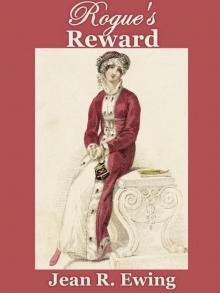 Rogue's Reward
Rogue's Reward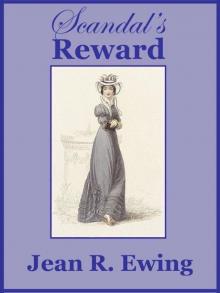 Scandal's Reward
Scandal's Reward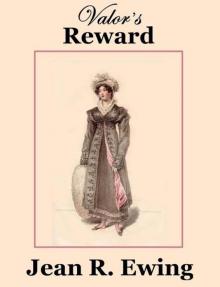 Valor's Reward
Valor's Reward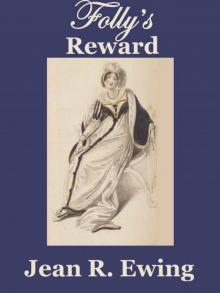 Folly's Reward
Folly's Reward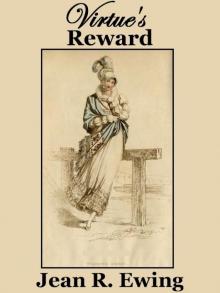 Virtue's Reward
Virtue's Reward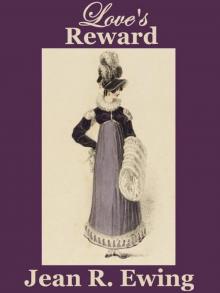 Love's Reward
Love's Reward